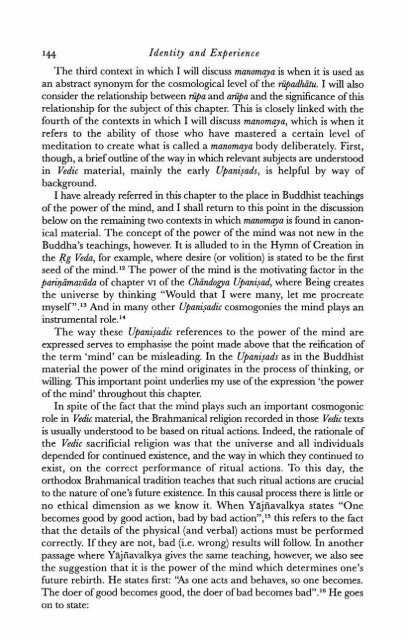Identity and Experience_Hamilton_1996
Identity and Experience_Hamilton_1996
Identity and Experience_Hamilton_1996
You also want an ePaper? Increase the reach of your titles
YUMPU automatically turns print PDFs into web optimized ePapers that Google loves.
I44<br />
<strong>Identity</strong> <strong>and</strong> <strong>Experience</strong><br />
The third context in which I will discuss manomaya is when it is used as<br />
an abstract synonym for the cosmological level of the nipadhtu. I will also<br />
consider the relationship between riipa <strong>and</strong> ariipa <strong>and</strong> the sigrdicance of this<br />
relationship for the subject of this chapter. This is closely linked with the<br />
fourth of the contexts in which I will discuss manomaya, which is when it<br />
refers to the ability of those who have mastered a certain level of<br />
meditation to create what is called a manomaya body deliberately. First,<br />
though, a brief outline of the way in which relevant subjects are understood<br />
in Vedic material, mainly the early Upani~ads, is helpful by way of<br />
background.<br />
I have already referred in this chapter to the place in Buddhist teachings<br />
of the power of the mind, <strong>and</strong> I shall return to this point in the discussion<br />
below on the remaining two contexts in which manomaya is found in canonical<br />
material. The concept of the power of the mind was not new in the<br />
Buddha's teachings, however. It is alluded to in the Hymn of Creation in<br />
the Rg Veda, for example, where desire (or volition) is stated to be the first<br />
seed of the mind.'* The power of the mind is the motivating factor in the<br />
ParipimavcZda of chapter VI of the ChcZndogya Upanipd, where Being creates<br />
the universe by thinking "Would that I were many, let me procreate<br />
myself".13 And in many other Upani~adicosmogonies the mind plays an<br />
instrumental role. l4<br />
The way these Upani;adic references to the power of the mind are<br />
expressed serves to emphasise the point made above that the reification of<br />
the term 'mind' can be misleading. In the UpaniSads as in the Buddhist<br />
material the power of the mind originates in the process of thinking, or<br />
willing. This important point underlies my use of the expression 'the power<br />
of the mind' throughout this chapter.<br />
In spite of the fact that the mind plays such an important cosmogonic<br />
role in Edic material, the Brahmanical religion recorded in those Vedic texts<br />
is usually understood to be based on ritual actions. Indeed, the rationale of<br />
the Vedic sacrificial religion was that the universe <strong>and</strong> all individuals<br />
depended for continued existence, <strong>and</strong> the way in which they continued to<br />
exist, on the correct performance of ritual actions. To this day, the<br />
orthodox Brahmanical tradition teaches that such ritual actions are crucial<br />
to the nature of one's future existence. In this causal process there is little or<br />
no ethical dimension as we know it. When Yajfiavalkya states "One<br />
becomes good by good action, bad by bad acti~n",'~ this refers to the fact<br />
that the details of the physical (<strong>and</strong> verbal) actions must be performed<br />
correctly. If they are not, bad (i.e. wrong) results will follow. In another<br />
passage where Yaj iiavalkya gives the same teaching, however, we also see<br />
the suggestion that it is the power of the mind which determines one's<br />
future rebirth. He states first: 'As one acts <strong>and</strong> behaves, so one becomes.<br />
The doer of good becomes good, the doer of bad becomes bad".16 He goes<br />
on to state:


